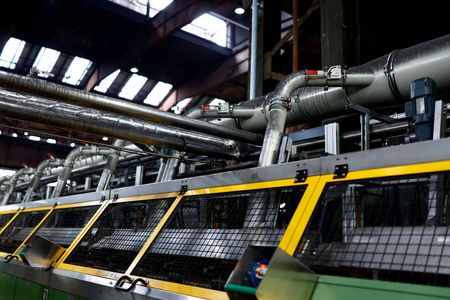By Maria Martinez
(Reuters) -German industrial orders fell in October, sapped by weak domestic demand, showing that a recovery in the industrial sector is not in sight.
Orders declined by 1.5% on the previous month on a seasonally and calendar adjusted basis, the federal statistics office said on Thursday.
A Reuters poll of analysts had pointed to a fall of 2.0%.
The negative development stems from declines in the manufacture of machinery and equipment by 7.6% on the month and in the automotive industry by 3.7%.
On the other hand, increases were observed in the manufacture of basic metals, up 10.2% on the month, and the manufacture of computer, electronic and optical products, which rose 8.0% compared to the previous month.
When large-scale orders are excluded, new orders were 0.1% higher than in the previous month.
The less volatile three-month on three-month comparison showed total new orders were 2.7% higher in the period from August to October than in the prior three months, according to the statistics office data.
October’s expected decline from a sharp increase the previous month was somewhat smaller than feared, while the previous month’s figure was revised noticeably upwards, said Elmar Voelker, economist at LBBW.
After revision of the provisional results, new orders in September increased by 7.2% compared with August, more than the 4.2% previously reported. The revision is due to a large-scale order in the manufacture of ships.
“There is therefore a small glimmer of hope in the trend of the past three to six months,” Voelker said. “In view of the many economic and geopolitical risk factors, however, it would be premature to speak of an incipient turn for the better.”
Although there is still hope the industry will bottom out, that is unlikely to halt the reduction in capacity, said Alexander Krueger, chief economist at Hauck Aufhaeuser Lampe.
“After all, it is also uncertain whether and how a new German government will come to the industry’s aid,” Lampe said. Germany will hold election on Feb. 23 after the coalition government collapsed last month.
Domestic orders dropped by 5.3% and total foreign orders rose slightly by 0.8%, with new orders from the euro zone decreasing by 7.6% and orders from outside the euro zone rising by 6.3%, the statistics office said.
The economies of neighbouring euro zone countries are currently driven primarily by the service sector and are therefore of no help to German industry, said Thomas Gitzel, chief economist at VP Bank.
“A sustained change in the trend of new orders is not to be expected,” Gitzel said. “The economic development in Germany’s key sales markets is too weak for this.”
(Reporting by Elizaveta Gladun in Gdansk and Maria Martinez in Berlin; Editing by Miranda Murray and Clarence Fernandez)

